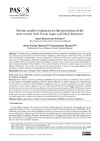Identificador persistente para citar o vincular este elemento:
https://accedacris.ulpgc.es/jspui/handle/10553/37116
| Campo DC | Valor | idioma |
|---|---|---|
| dc.contributor.author | Batista de Freitas, Joao | en_US |
| dc.contributor.author | Carlos Martin, Juan | en_US |
| dc.contributor.author | Roman, Concepcion | en_US |
| dc.contributor.other | Martin, Juan Carlos | - |
| dc.date.accessioned | 2018-05-21T09:15:37Z | - |
| dc.date.available | 2018-05-21T09:15:37Z | - |
| dc.date.issued | 2017 | en_US |
| dc.identifier.issn | 1695-7121 | en_US |
| dc.identifier.uri | https://accedacris.ulpgc.es/handle/10553/37116 | - |
| dc.description.abstract | This article solves a multidimensional problem in order to evaluate the satisfaction of the wine tourist that visited a winery located in the South of Brazil, employing a method based on fuzzy logic. Thus, a synthetic index of satisfaction is calculated for a group of segments in which we are interested, namely, gender and image prior to the visit. The problem of linguistic ambiguity is addressed with the fuzzy sets theory, applying triangular fuzzy numbers (TFN). The synthetic index of satisfaction is based on the concept of the degree of optimality by the technique of similarity of ideal solutions. The results obtained show that the analyzed segments experienced different satisfaction. Our results can be used by the winery directors as well as by the regional planners and managers, in order to improve the competitiveness of this market niche. | en_US |
| dc.description.abstract | Este artículo resuelve un problema multidimensional para evaluar la satisfacción de los enoturistas que visitaron una bodega situada en el sur de Brasil utilizando un método basado en la lógica borrosa. De esta forma, se calcula un índice sintético de satisfacción para un grupo de segmentos en los que estamos interesados, a saber, género e imagen previa a la visita. El problema de la ambigüedad lingüística se aborda desde la teoría de los conjuntos borrosos aplicando números borrosos triangulares (NBT). El indicador sintético de la satisfacción se basa en el concepto de grado de optimalidad mediante la técnica de la semejanza a las soluciones ideales. Los resultados obtenidos muestran que los segmentos analizados experimentan una distinta satisfacción. Nuestros resultados pueden usarse por los directivos de la bodega, así como por los planificadores y administradores de la región, para mejorar la competitividad de este nicho de mercado. | en_US |
| dc.language | eng | en_US |
| dc.relation.ispartof | Pasos: revista de turismo y patrimonio cultural | en_US |
| dc.source | Pasos: revista de turismo y patrimonio cultural [ISSN 1695-7121], v. 15 (2), p. 341-358 | en_US |
| dc.subject | 531290 Economía sectorial: turismo | en_US |
| dc.subject.other | Fuzzy Logic | en_US |
| dc.subject.other | Triangular Fuzzy Numbers | en_US |
| dc.subject.other | TOPSIS | en_US |
| dc.subject.other | Wine tourism | en_US |
| dc.subject.other | Satisfaction | en_US |
| dc.subject.other | Lógica borrosa | en_US |
| dc.subject.other | Números borrosos triangulares | en_US |
| dc.subject.other | TOPSIS | en_US |
| dc.subject.other | Enoturismo | en_US |
| dc.subject.other | Satisfacción | en_US |
| dc.title | Service quality evaluation in the perception of the wine tourist with Fuzzy Logic and Ideal Solutions | en_US |
| dc.title.alternative | Evaluación de la calidad de servicio en percepción del enoturista mediante la Lógica Borrosa y las Soluciones Ideales | en_US |
| dc.type | info:eu-repo/semantics/Article | en_US |
| dc.type | Article | es |
| dc.identifier.doi | 10.25145/j.pasos.2017.15.022 | en_US |
| dc.identifier.isi | 000402663800005 | - |
| dcterms.isPartOf | Pasos-Revista De Turismo Y Patrimonio Cultural | - |
| dcterms.source | Pasos-Revista De Turismo Y Patrimonio Cultural[ISSN 1695-7121],v. 15 (2), p. 341-358 | - |
| dc.description.lastpage | 358 | - |
| dc.identifier.issue | 2 | - |
| dc.description.firstpage | 341 | - |
| dc.relation.volume | 15 | - |
| dc.investigacion | Ciencias Sociales y Jurídicas | en_US |
| dc.type2 | Artículo | en_US |
| dc.identifier.wos | WOS:000402663800005 | - |
| dc.contributor.daisngid | 3214567 | - |
| dc.contributor.daisngid | 648015 | - |
| dc.contributor.daisngid | 460136 | - |
| dc.identifier.investigatorRID | F-6473-2014 | - |
| dc.contributor.wosstandard | WOS:de Freitas, JB | |
| dc.contributor.wosstandard | WOS:Martin, JC | |
| dc.contributor.wosstandard | WOS:Roman, C | |
| dc.date.coverdate | Abril 2017 | |
| dc.identifier.ulpgc | Sí | es |
| dc.description.sellofecyt | Sello FECYT | |
| dc.description.esci | ESCI | |
| dc.description.dialnetimpact | 0,0 | |
| dc.description.dialnetq | Q1 | |
| dc.description.dialnetd | D2 | |
| dc.description.erihplus | ERIH PLUS | |
| item.grantfulltext | open | - |
| item.fulltext | Con texto completo | - |
| crisitem.author.dept | GIR TIDES: Investigación en Turismo y Transporte | - |
| crisitem.author.dept | IU de Turismo y Desarrollo Económico Sostenible | - |
| crisitem.author.dept | Departamento de Análisis Económico Aplicado | - |
| crisitem.author.dept | GIR TIDES: Investigación en Turismo y Transporte | - |
| crisitem.author.dept | IU de Turismo y Desarrollo Económico Sostenible | - |
| crisitem.author.dept | Departamento de Análisis Económico Aplicado | - |
| crisitem.author.orcid | 0000-0002-2950-2405 | - |
| crisitem.author.orcid | 0000-0002-0591-1298 | - |
| crisitem.author.parentorg | IU de Turismo y Desarrollo Económico Sostenible | - |
| crisitem.author.parentorg | IU de Turismo y Desarrollo Económico Sostenible | - |
| crisitem.author.fullName | Martín Hernández, Juan Carlos | - |
| crisitem.author.fullName | Román García, Concepción | - |
| Colección: | Artículos | |
Citas de WEB OF SCIENCETM
Citations
5
actualizado el 01-mar-2026
Visitas
122
actualizado el 10-ene-2026
Descargas
104
actualizado el 10-ene-2026
Google ScholarTM
Verifica
Altmetric
Comparte
Exporta metadatos
Los elementos en ULPGC accedaCRIS están protegidos por derechos de autor con todos los derechos reservados, a menos que se indique lo contrario.
